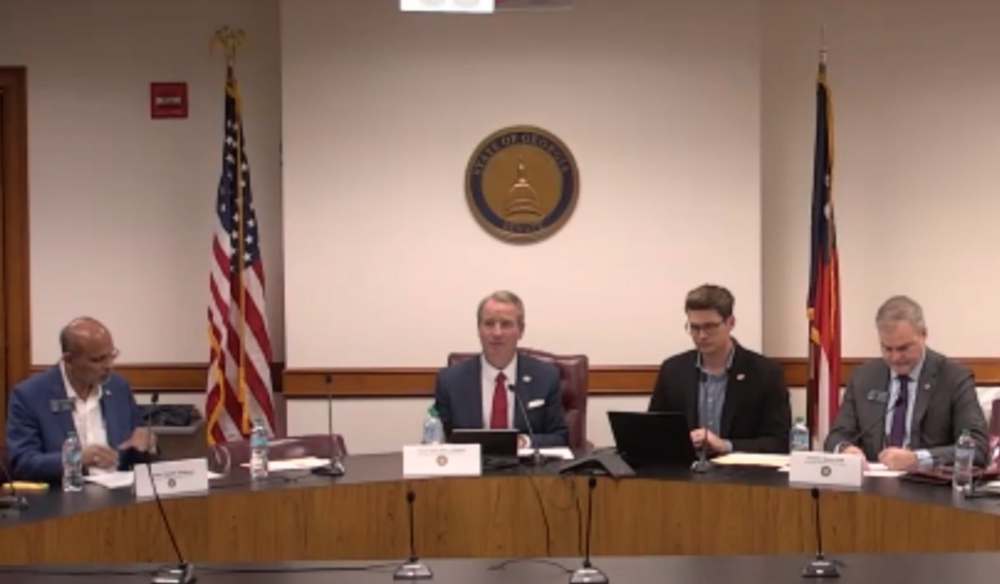
Caption
State Sen. John Albers (center) chairs a meeting of the Senate Study Committee on Artificial Intelligence on Dec. 3, 2024.
Credit: Screenshot
It's a common misconception that the 40-day legislative session is the only work elected state lawmakers do. But it's when they are out of session that the essential work is done before creating laws each January. Lawmakers' Donna Lowry revisits her interview with Sen. John Albers, who chairs the Senate Public Safety Committee.

State Sen. John Albers (center) chairs a meeting of the Senate Study Committee on Artificial Intelligence on Dec. 3, 2024.
The Georgia legislature is out of session, but the members remain busy. This is homework time for them as they prepare for next January — and they do it through committee work.
In this week’s Lawmakers Huddle, GPB Donna Lowry explains why the process is critical to the lawmaking process.
Donna Lowry: It's a common misconception that the 40-day legislative session is the only work elected state lawmakers do. In reality, this period — when they are out of session — is essential to the work of creating laws that begins each January.
They are researching and gathering the necessary information to create effective laws, primarily through committee work.
Last year, for Lawmakers Huddle, I explained some of what legislators do. I think it’s a good time to revisit my interview with Sen. John Albers of Roswell, who chairs the Senate Public Safety Committee.
John Albers: During the legislative session, which starts the second Monday in January, through typically the end of March or early April, is my part-time job is about 80 to 120 hours a week. And thankfully, after that's over, it goes down to a comfortable 50 to 70 hours a week, as the process of serving constituents never ends. Committee work, study committees, keeping up with the budget — being a part of the appropriations process — being out with the public, meeting with folks; that part never goes away. In fact, at certain times of the year, it increases even moreso. But that's part of doing the job. That's why it's such an honor to serve in these offices, because you get that ability to help other people.
Donna Lowry: There are various types of committees, including about 70 standing committees [between the two chambers]. They don't change.
Senator Albers…
John Albers: Committees are critical, and that's where a lot of the hard and heavy lifting comes into play. Any legislator can drop any bill that they want to, and a lot those are very important and very meaningful — and sometimes there's a couple that make us shake our heads. But in general, the committee process is used to really thoroughly vet, to research, to understand.
Donna Lowry: Each chamber can establish special committees and study committees.
Study committees will conduct the majority of their work in the coming months. These are the panels lawmakers voted to create during the legislative session to explore issues that require a thorough examination.
Currently, House and Senate study committees are examining cancer care access, gaming, election procedures, chronic absenteeism in schools, family caregiving services, and about two dozen other topics.
John Albers: They're so valuable to us to really take an intense focus on a specific issue or a specific area that we need to get more education.
We need to find out what the best practices are from maybe other states or other regions. We need to figure out where we may have an opportunity to improve or there could be deficiencies. Ultimately, these culminate in a committee report from that study committee. And that study community will come up with recommendations. Sometimes that's legislation. Sometimes that is budget. Sometimes that changes the way we do things.
Donna Lowry: In the House, Speaker Jon Burns appoints members to the various study committees. Lt. Gov. Burt Jones makes those assignments in the Senate.
Now, for standing committees, while the speaker selects committee members, in the Senate, they have another committee for that process. It’s called the Committee on Assignments, and lawmakers lobby for the issues they want to address.
Once again, Sen. Albers.
John Albers: So every two years, we submit a form of what committees we'd like to be a part of, but also why. What's our background and experience? In public safety, well, I've been in the fire service and EMS and generations of my family for a long time, so there's kind of a natural fit for me to be part public safety — in this case, chairing it. But I also have a background in finance and tax policy, so that's how I end up in those committees.
Donna Lowry: Committees have tremendous power in determining a bill’s future.
The chair of each standing committee has the latitude to move legislation along — or effectively kill it.
John Albers: I can choose not to hear a bill at all, because I believe that the legislation is not something that should be heard for a variety of reasons. I could also assign a bill to a subcommittee within my committee. I can create subcommittees. I can dissolve subcommittees. I can decide that I want to hear a bill, but not take a vote on it.
Donna Lowry: In the coming weeks on Lawmakers Huddle, we will report on what they are doing this summer in study committees.
For Lawmakers Huddle, I’m Donna Lowry.